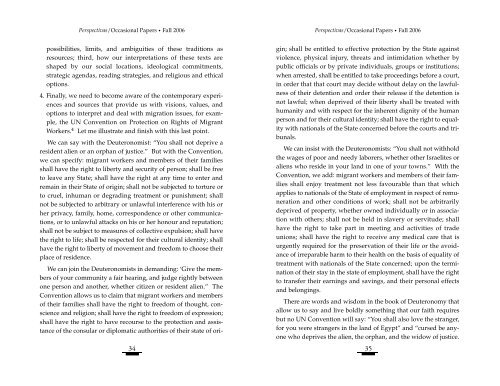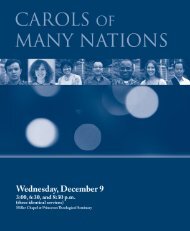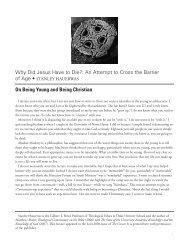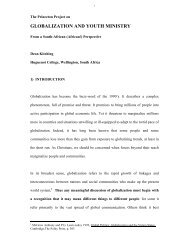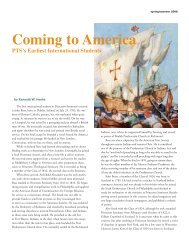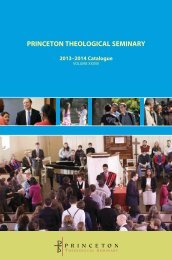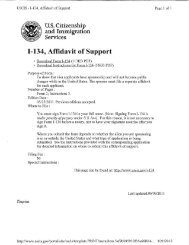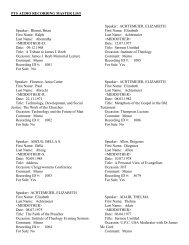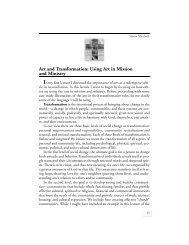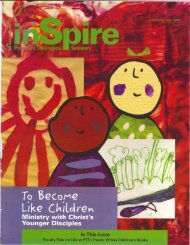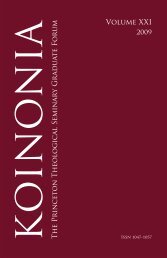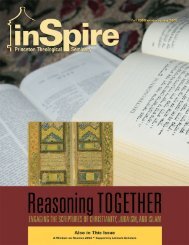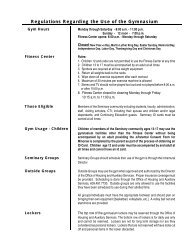P E R S P E C T I VAS - Princeton Theological Seminary
P E R S P E C T I VAS - Princeton Theological Seminary
P E R S P E C T I VAS - Princeton Theological Seminary
You also want an ePaper? Increase the reach of your titles
YUMPU automatically turns print PDFs into web optimized ePapers that Google loves.
Perspectivas/Occasional Papers • Fall 2006Perspectivas/Occasional Papers • Fall 2006possibilities, limits, and ambiguities of these traditions asresources; third, how our interpretations of these texts areshaped by our social locations, ideological commitments,strategic agendas, reading strategies, and religious and ethicaloptions.4. Finally, we need to become aware of the contemporary experiencesand sources that provide us with visions, values, andoptions to interpret and deal with migration issues, for example,the UN Convention on Protection on Rights of MigrantWorkers. 4 Let me illustrate and finish with this last point.We can say with the Deuteronomist: “You shall not deprive aresident alien or an orphan of justice.” But with the Convention,we can specify: migrant workers and members of their familiesshall have the right to liberty and security of person; shall be freeto leave any State; shall have the right at any time to enter andremain in their State of origin; shall not be subjected to torture orto cruel, inhuman or degrading treatment or punishment; shallnot be subjected to arbitrary or unlawful interference with his orher privacy, family, home, correspondence or other communications,or to unlawful attacks on his or her honour and reputation;shall not be subject to measures of collective expulsion; shall havethe right to life; shall be respected for their cultural identity; shallhave the right to liberty of movement and freedom to choose theirplace of residence.We can join the Deuteronomists in demanding: ‘Give the membersof your community a fair hearing, and judge rightly betweenone person and another, whether citizen or resident alien.” TheConvention allows us to claim that migrant workers and membersof their families shall have the right to freedom of thought, conscienceand religion; shall have the right to freedom of expression;shall have the right to have recourse to the protection and assistanceof the consular or diplomatic authorities of their state of ori-34gin; shall be entitled to effective protection by the State againstviolence, physical injury, threats and intimidation whether bypublic officials or by private individuals, groups or institutions;when arrested, shall be entitled to take proceedings before a court,in order that that court may decide without delay on the lawfulnessof their detention and order their release if the detention isnot lawful; when deprived of their liberty shall be treated withhumanity and with respect for the inherent dignity of the humanperson and for their cultural identity; shall have the right to equalitywith nationals of the State concerned before the courts and tribunals.We can insist with the Deuteronomists: “You shall not withholdthe wages of poor and needy laborers, whether other Israelites oraliens who reside in your land in one of your towns.” With theConvention, we add: migrant workers and members of their familiesshall enjoy treatment not less favourable than that whichapplies to nationals of the State of employment in respect of remunerationand other conditions of work; shall not be arbitrarilydeprived of property, whether owned individually or in associationwith others; shall not be held in slavery or servitude; shallhave the right to take part in meeting and activities of tradeunions; shall have the right to receive any medical care that isurgently required for the preservation of their life or the avoidanceof irreparable harm to their health on the basis of equality oftreatment with nationals of the State concerned; upon the terminationof their stay in the state of employment, shall have the rightto transfer their earnings and savings, and their personal effectsand belongings.There are words and wisdom in the book of Deuteronomy thatallow us to say and live boldly something that our faith requiresbut no UN Convention will say: “You shall also love the stranger,for you were strangers in the land of Egypt” and “cursed be anyonewho deprives the alien, the orphan, and the widow of justice.35


